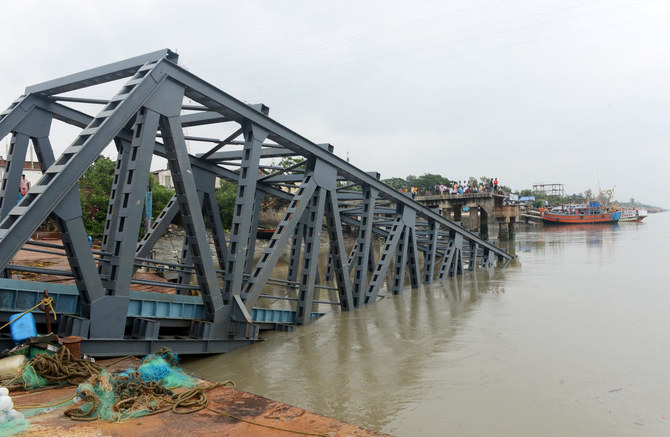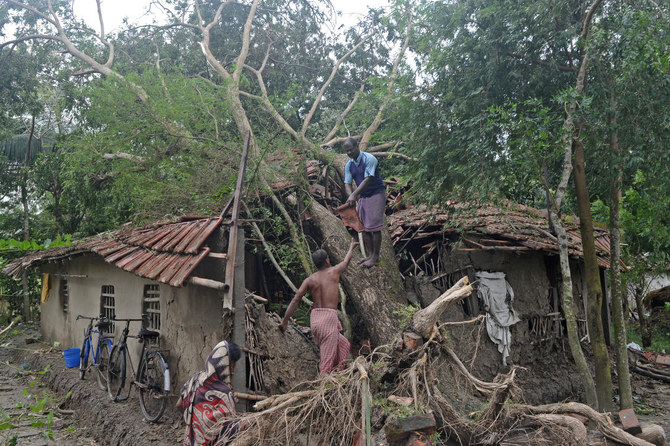KHULNA: Twenty people died and more than two million others spent a night huddled in storm shelters as Cyclone Bulbul smashed into the coasts of India and Bangladesh with fierce gales and torrential rains, officials said Sunday.
The cyclone packed winds of up to 120 kilometers (75 miles) per hour when it hit late Saturday, forcing the closure of ports and airports in both countries.
Ten people were killed in India’s West Bengal state, the Press Trust of India reported, including two after uprooted trees fell on their homes and another after being struck by falling branches in Kolkata.
Two others died in nearby Odisha state, PTI reported.
In Bangladesh, eight people were killed — five by falling trees — and at least 20 people were injured.
Five others are missing after a fishing trawler sank in squally weather on Meghna river near the southern island of Bhola, district administrator Masud Alam Siddiqui told AFP.
The cyclone also damaged some 4,000 mostly mud and tin-built houses, disaster management secretary Shah Kamal told AFP.
In coastal Khulna, the worst-hit district in Bangladesh, trees swayed violently and were ripped from the ground in the fierce storm, blocking roads and hampering access to the area.
Some low-lying parts of the district were flooded, disaster management minister Enamur Rahman told AFP.
Authorities said the cyclone was weakening as it moved inland.
“It has turned into a deep depression, causing heavy rainfall,” Bangladesh weather bureau deputy chief Ayesha Khatun told AFP.
Bulbul hit the coast at the Sundarbans, the world’s largest mangrove forest which straddles Bangladesh and India, and is home to endangered species including Bengal tigers and Irrawaddy dolphins.
The mangroves shielded the coast from the storm’s full impact, Khatun said.
Some 2.1 million people across Bangladesh were relocated to cyclone shelters.
Troops were sent to coastal districts while tens of thousands of volunteers went door-to-door and used loudspeakers to urge people to evacuate their villages.
“We spent the night with another 400 people,” said Ambia Begum, who arrived at a shelter in the port town of Mongla late Saturday along with her family.
“I am worried about my cattle and the straw roof of my house. I could not bring them here. Allah knows what is happening there,” the 30-year-old mother of three told AFP.
Around 1,500 tourists were stranded on St. Martin’s island off southeastern Bangladesh after boat services were canceled.
In India, nearly 120,000 people who were evacuated started to return home as the cyclone weakened, authorities said.
“The storm has left a trail of destruction as it’s crossed the coastline of West Bengal,” the state’s Urban Development Minister Firhad Hakim said.
In Odisha, crops in coastal regions were extensively damaged by the cyclone, officials told AFP.
Bangladesh’s low-lying coast, home to 30 million people, and India’s east are regularly battered by cyclones.
Hundreds of thousands of people living around the Bay of Bengal have been killed in cyclones in recent decades.
While the frequency and intensity of the storms have increased, partly due to climate change, the death tolls have come down because of faster evacuations and the building of thousands of coastal shelters.
Cyclone Fani was the most powerful storm to hit the area in years when it struck in May, killing 12 people.


20 dead as Cyclone Bulbul smashes into India, Bangladesh coasts
20 dead as Cyclone Bulbul smashes into India, Bangladesh coasts

- The cyclone packed winds of up to 120 kilometers (75 miles) per hour when it hit late Saturday
- In Bangladesh, eight people were killed — five by falling trees — and at least 20 people were injured
Australian police probe threatening letter to country’s largest mosque ahead of Ramadan

- The Lebanese Muslim Association, which runs the mosque, told the Australian Broadcasting Corp. (ABC) it had written to the government to request more funding for additional security guards and CCTV
SYDNEY: Australian police said on Thursday they had launched an investigation after a threatening letter was sent to the country’s largest mosque, the third such incident in the lead-up to the Muslim fasting month of Ramadan.
The letter sent to Lakemba Mosque in Sydney’s west on Wednesday contained a drawing of a pig and a threat to kill the “Muslim race,” local media reported. Police said they had taken the letter for forensic testing, and would continue to patrol religious sites including the mosque, as well as community events.
The latest letter comes weeks after a similar message was mailed to the mosque, depicting Muslim people inside a mosque on fire. Police have also arrested and charged a 70-year-old man in connection with a third threatening letter sent to Lakemba Mosque’s staff in January.
The Lebanese Muslim Association, which runs the mosque, told the Australian Broadcasting Corp. (ABC) it had written to the government to request more funding for additional security guards and CCTV cameras.
Some 5,000 people are expected to attend the mosque each night during Ramadan. More than 60 percent of residents in the suburb of Lakemba identify as Muslim, according to the Australian Bureau of Statistics.
Prime Minister Anthony Albanese condemned the recent string of threats.
“It is outrageous that people just going about commemorating their faith, particularly during the holy month for Muslims of Ramadan, are subject to this sort of intimidation,” he told ABC radio.
“I have said repeatedly we need to turn down the temperature of political discourse in this country, and we certainly need to do that.” Anti-Muslim sentiment has been growing in Australia since the war in Gaza War in late 2023, according to a recent report commissioned by the government.
The Islamophobia Register Australia has also documented a 740 percent rise in reports following the Bondi mass shooting on December 14, where authorities allege two gunmen inspired by Islamic State killed 15 people attending a Jewish holiday celebration.
The letter sent to Lakemba Mosque in Sydney’s west on Wednesday contained a drawing of a pig and a threat to kill the “Muslim race,” local media reported. Police said they had taken the letter for forensic testing, and would continue to patrol religious sites including the mosque, as well as community events.
The latest letter comes weeks after a similar message was mailed to the mosque, depicting Muslim people inside a mosque on fire. Police have also arrested and charged a 70-year-old man in connection with a third threatening letter sent to Lakemba Mosque’s staff in January.
The Lebanese Muslim Association, which runs the mosque, told the Australian Broadcasting Corp. (ABC) it had written to the government to request more funding for additional security guards and CCTV cameras.
Some 5,000 people are expected to attend the mosque each night during Ramadan. More than 60 percent of residents in the suburb of Lakemba identify as Muslim, according to the Australian Bureau of Statistics.
Prime Minister Anthony Albanese condemned the recent string of threats.
“It is outrageous that people just going about commemorating their faith, particularly during the holy month for Muslims of Ramadan, are subject to this sort of intimidation,” he told ABC radio.
“I have said repeatedly we need to turn down the temperature of political discourse in this country, and we certainly need to do that.” Anti-Muslim sentiment has been growing in Australia since the war in Gaza War in late 2023, according to a recent report commissioned by the government.
The Islamophobia Register Australia has also documented a 740 percent rise in reports following the Bondi mass shooting on December 14, where authorities allege two gunmen inspired by Islamic State killed 15 people attending a Jewish holiday celebration.
© 2026 SAUDI RESEARCH & PUBLISHING COMPANY, All Rights Reserved And subject to Terms of Use Agreement.














